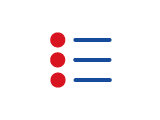Suggested Search
Becoming a responsible investor isn't made easier by having to get your head around an endless stream of jargon, acronyms, and technical language. Our short sharp A-Z explainers will help you make sense of the terminology.
Do you also struggle to make sense of all the jargon used in the investment world generally? Our Glossary of common investment terms gives you a quick take on the terminology.
Responsible investing is a broad area that includes major global themes such as climate change and sustainability. In a few cases the terms below are defined slightly differently in different countries or by different organisations. For this glossary we’ve tried to adopt the more commonly used definitions and where relevant, ones with an Australian bias.
Active ownership
Also known as stewardship, active ownership is an investment approach that employs shareholder power to influence corporate behaviour, including through direct company engagement and proxy voting, and divestment or exclusion.
Bonded labour
Also known as debt bondage, this is a form of modern slavery where someone is forced to work in exchange for a loan or to pay off debt inherited from a relative. In reality, the worker is rarely able to pay off the interest and the loan amount. Bonded labour is one of the leading forms of modern slavery in India and South Asia.
Carbon emissions
Carbon is a naturally occurring chemical compound like oxygen or hydrogen, and one of the organic building blocks of all life on earth. However, carbon dioxide (often referred to by its scientific name CO2) is the principal greenhouse gas (GHG) which affects the Earth’s climate The presence of CO2 in the atmosphere acts as a blanket or ‘greenhouse’ that traps heat, in turn warming the planet.
Carbon credits
Carbon credit schemes operate around the world. In Australia carbon credits are a type of financial product issued by the federal government to organisers of projects that reduce carbon emissions. Typically these are projects to re-establish native vegetation which, like all plant life, removes carbon dioxide from the atmosphere.
Australia’s carbon credits are called Australian Carbon Credit Units (ACCU). One ACCU represents one tonne of carbon dioxide a project has stored or avoided producing. When a project has been issued with ACCUs they can sell them back to the government or to other organisations needing to offset their emissions.
Carbon Disclosure Project (CDP)
The CDP is an international charity that operates a global disclosure system to help companies, cities, states, regions and public authorities report their environmental impacts and what they’re doing to reduce them.
Carbon footprint
A carbon footprint is the total amount of carbon dioxide released into the atmosphere as a result of the activities of a particular activity, product, company or country.
Carbon neutral
Carbon neutrality means having a balance between emitting carbon and absorbing carbon from the atmosphere in carbon sinks. Removing carbon oxide from the atmosphere and then storing it is known as carbon sequestration. In order to achieve net zero emissions, all worldwide greenhouse gas (GHG) emissions will have to be counterbalanced by carbon sequestration.
Carbon offset
A company can use carbon offsetting to become carbon neutral, either by doing something that reduces CO2 in the atmosphere such as planting trees, or by buying carbon credits.
Circular economy
Most countries have ‘linear economies’ in which raw materials are taken from the earth and turned into products which we use and then throw away. By contrast, a circular economy is based around creating less waste, reusing materials to keep them in circulation for longer, and using natural resources more sustainably.
Clean energy
Clean energy is energy that comes from renewable, zero emission sources that come from non-polluting sources, such as solar, wind or wave power as opposed to traditional fossil fuel sources like coal, oil and gas.
Climate change
Climate change refers to a change in the state of the climate that can be identified which persists for an extended period, typically decades or longer. It may be due to natural processes but tends to be used when referring to a ‘change of climate which is attributed directly or indirectly to human activity that alters the composition of the global atmosphere.’
CO2
CO2 is the scientific abbreviation for carbon dioxide, the gas created by burning fossil fuels and one of the biggest contributors to climate change.
Corporate governance
Corporate governance is the formal system of rules and processes by which a company is run. It’s of interest to all investors and will also reflect the importance a company gives to environmental and social risks, levels of disclosure and transparency and future corporate strategy.
Corporate social responsibility (CSR)
The World Bank considers corporate social responsibility (also referred to as ‘social licence to operate’) as the commitment of business to contribute to sustainable economic development – working with employees, their families, the local community and society at large to improve the quality of life.
Debt bondage
Another name for bonded labour and a form of modern slavery.
Decarbonisation
Decarbonisation is the process of reducing or eliminating carbon emissions. Often used when referring to reducing CO2 emissions from activities such as fossil fuel consumption for industry, transport and electricity generation.
Digital carbon footprint
This term describes the amount of greenhouse gas emissions produced by digital devices. Most electronic devices have a digital carbon footprint including computers, mobile phones, data centres and use of the internet.
Cryptocurrencies such as Bitcoin have big digital carbon footprints because the way they operate needs huge amounts of computer power and high electricity consumption.
Domestic servitude
A form of modern slavery where an individual does domestic work without being able to leave, and is often subjected to psychological control and physical abuse.
ESG
ESG stands for environmental, social and governance. Investors are increasingly applying these non-financial factors as part of their analysis process to identify material risks and growth opportunities.
Some examples of ESG risks could be industries and companies that:
- Harm the environment by pollution or high non-renewable energy use (Environmental)
- Employ child labour or suppress human rights (Social)
- Are not run fairly and transparently (Governance)
The three ESG categories (environmental, social, governance) shouldn’t be regarded as rigid definitions. Often, an ESG consideration won’t fall only into one clear category – it may overlap or be interlinked across two or more.
ESG Integration
The PRI defines ESG integration as “the process of including ESG factors in investment analysis and decisions to better manage risks and improve returns”.
For CFS FirstChoice this includes understanding the level to which our fund managers include ESG factors in their processes whilst appreciating that the opportunities and techniques used to integrate ESG risk analysis will vary by asset class.
Forced marriage
A marriage that one or both of the people involved didn’t consent to and which they can’t leave freely. Forced marriage can involve forced labour, sexual exploitation or domestic servitude.
Fossil fuels
Carbon-based fuels from fossil hydrocarbon deposits, including coal, oil, and natural gas, fossil fuels are so called because they form over millions of years and naturally occur in the earth. They’re therefore classed as non-renewable energy sources. Burning fossil fuels, for example to generate electricity or as petrol in our cars, is a leading cause of climate change.
Green bonds
Green bonds are a type of fixed income instrument designed to support specific climate related or environmental projects.
Greenhouse gas (GHG) emissions
GHG emissions are the emissions of heat-trapping gases that cause man-made climate change.
The six gases listed in the Kyoto Protocol are: carbon dioxide (CO2); methane (CH4); nitrous oxide (N2O); hydrofluorocarbons (HFCs); perfluorocarbons (PFCs); and sulphur hexafluoride (SF6).
Greenwashing
Greenwashing is a term used to describe misleading claims by an organisation about the sustainability credentials of their operations or products. It may take the form of advertising or marketing designed to persuade the consumer that they are more environmentally friendly than they actually are.
Global Report Initiative (GRI)
The GRI is a non-profit and independent standards organisation that helps companies and governments worldwide to report on their environmental, social and economic impacts. The GRI reporting standards are the most widely used standards for sustainability reporting globally.
Global warming
Global warming refers to the effect of greenhouse gas emissions on the earth’s atmosphere. Once a commonly used expression, it’s now been largely replaced by ‘climate change’ as the overarching term for the global climate crisis.
Greenhouse Gas Protocol
The Greenhouse Gas Protocol is an internationally recognised forum that provides globally standardised tools to help corporations, cities and countries track their progress towards their emission reduction targets, such as those set at the Paris Agreement.
Impact investing
Impact investments are investments made with the intention to generate positive, measurable, social, environmental or ethical impact alongside a financial return. Another essential aspect of impact investing is the investor's commitment to measure and report the social and/or environmental performance and progress of underlying investments.
Intergovernmental Panel on Climate Change (IPCC)
The IPCC is the United Nations’ body for evaluating scientific climate change information. It was set up to give policymakers scientific insights into the effects and future risks posed by climate change.
International Energy Agency (IEA)
The IEA is an independent global energy authority that provides data, analysis and advice on fuels and technologies to its 29 member countries. Taking an all-fuels, all-technology approach, the IEA recommends policies that enhance the reliability, affordability and sustainability of energy. Australia has been an IEA member since 1979.
Modern slavery
Modern slavery is a form of human rights violation where a person is forced into something against their will. It includes human trafficking, forced labour, debt bondage and bonded labour, child slavery forced marriage, and domestic servitude.
Negative screening
Negative (or ‘exclusionary’) screening is the exclusion of or limitation of investment to certain sectors, companies, jurisdictions or business activities based on specific ESG criteria. Screens may include a revenue threshold that prohibits investment that derives a certain proportion of its revenue from the screened activity. Screens may exist on the basis of ethical or religious values, global norms, sustainability concerns, or how inadequate a company or country response is to emergent risks such as climate change impacts.
Net zero
Net zero emissions are achieved when the man-made greenhouse gases released into the atmosphere are balanced by human managed removals over a specified period.
Paris Agreement
The Paris Agreement is a legally binding international treaty made at the United Nations (UN) Climate Change Conference in Paris, France, in 2015. It’s a commitment from 196 UN countries to ‘hold the increase in the global average temperature to well below 2 degrees C above pre-industrial levels’ and to pursue efforts to limit the increase to 1.5degrees C, as this would significantly reduce the risks and impacts of climate change.
Principles for Responsible investment (PRI)
The UN-supported PRI is the world’s leading proponent of responsible investment. It works to understand the investment implications of ESG factors and to support its international network of investor signatories in incorporating these factors into their investment and ownership decisions.
Renewable energy
Renewable energy is created from sources that will never run out, or from recycled sources. Wind, waves, solar, geothermal energy and biofuels are forms of renewable energy.
Responsible investing
The Principles of Responsible Investment define this as ‘a strategy and practice to incorporate ESG factors in investment decisions and active ownership’.
Science-based target
Science-based targets provide a clearly-defined pathway for companies to reduce greenhouse gas (GHG) emissions, helping prevent the worst impacts of climate change and future-proof business growth.
Scope 1, 2, 3 emissions
These three categories were developed by the Greenhouse Gas Protocol so a company can track the different ways in which its activities generate GHG emissions:
Scope 1: Direct emissions a company produces in its regular activities onsite such as by operating machinery, heating buildings, powering computers and running vehicles.
Scope 2: Indirect emissions from fossil fuels burned in producing the energy the company needs. Sourcing renewable energy or installing solar panels would therefore reduce a company’s Scope 2 emissions.
Scope 3: Indirect emissions produced by customers using the company’s products, or by suppliers making products the company needs. For example, a car manufacturer would have high Scope 3 emissions. This category is the hardest for companies to reduce because it’s usually outside their direct control.
Stewardship
Stewardship is another name for active ownership, an investment concept where investors (typically large institutions rather than individuals) use their influence as major shareholders to actively encourage the companies they invest in to meet environmental and social standards. This includes engagement, proxy voting and in some cases exclusions or divestment.
Sustainable Development Goals (SDG)
Also known as the Global Goals, the SDGs are a set of 17 interlinked goals adopted by the United Nations in 2015. They’re intended to be a global call to action to end poverty, protect the planet and drive social change such as ending discrimination against women.
Sustainable investments
Targeted investments that will benefit from and also drive long-term sustainability outcomes (such as safe and accessible water, sustainable agriculture, green buildings, lower carbon emissions, community programs).
Taskforce on Climate-Related Financial Disclosures (TCFD)
The TCFD was set up in 2015 by the Swiss-based Financial Stability Board as a way for organisations to make voluntary and consistent climate related financial risk disclosures. This makes it easier for potential investors, lenders and insurers to make decisions about companies and levels of climate-related risk.
United Nations Framework Convention on Climate Change (UNFCC)
The UNFCC is the United Nations entity tasked with supporting the global response to the threat of climate change.
Use of proceeds bond
This is a kind of debt issue where the issuer states how the funds will be spent. These may also be called ‘impact’ bonds because they fund activities that have a beneficial effect on the environment and/or society. Other terms used include green bonds, social bonds and sustainability bonds depending on the type of activity being funded.
What’s next?

Responsible investing
Learn about how Colonial First State invests responsibly and how this can impact your investments.

Investment options
Learn about the different types of investments you can make, and which might be right for you.

Long term performance
We strive to deliver strong long-term returns while providing members access to an extensive range of investments options.
Unleash in ways you never thought possible
Get in touch
Get in touch with us online or call us
8:30am to 6pm AEST Monday to Friday.
Find a financial adviser
Use our tool to find professional financial advice,
local to you.
Download mobile app
Track your balance and see your
transactions history from anywhere.
Avanteos Investments Limited ABN 20 096 259 979, AFSL 245531 (AIL) is the trustee of the Colonial First State FirstChoice Superannuation Trust ABN 26 458 298 557 and issuer of FirstChoice range of super and pension products. Colonial First State Investments Limited ABN 98 002 348 352, AFSL 232468 (CFSIL) is the responsible entity and issuer of products made available under FirstChoice Investments and FirstChoice Wholesale Investments.Information on this webpage is provided by AIL and CFSIL. It may include general advice but does not consider your individual objectives, financial situation, needs or tax circumstances. You can find the target market determinations (TMD) for our financial products at www.cfs.com.au/tmd, which include a description of who a financial product might suit. You should read the relevant Product Disclosure Statement (PDS) and Financial Services Guide (FSG) carefully, assess whether the information is appropriate for you, and consider talking to a financial adviser before making an investment decision. You can get the PDS and FSG at www.cfs.com.au or by calling us on 13 13 36.
